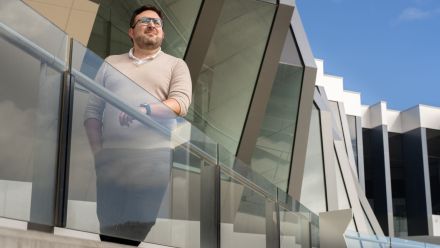ANU Spaces - Wen Zhang
Meet Wen Zhang who is a research fellow in the Research School of Engineering at ANU who recently received an ARC Discovery Early Career Researchers Award (DECRA).
Wen, can you tell us what you do on campus?
I am a Research Fellow in the Research School of Engineering at ANU College of Engineering and Computer Science (CECS). My research is all about sound - in particular, the areas of spatial audio and human hearing. Spatial audio means thinking about sound in three dimensions. We design and manipulate speakers so we can synthesize where the listener thinks the sound is coming from.
When and why did you decide to work in your field?
I completed the telecommunication undergraduate degree from Xidian University in China in 2003. Then I came to ANU to pursue my postgraduate study and completed my PhD in Audio Signal Processing in 2010. My background in telecommunications engineering and my love of music drew me to this area of study.
What’s your favourite spot on campus?
I love the Coffee Grounds cafe at the ANU Sports and Recreation Centre. It is a relaxed place for a morning coffee, meeting, or having lunch with friends.
If you were free for an afternoon, what would you do?
Go bushwalking around Canberra or sit in my backyard and read a book.
How will DECRA benefit your research?
The DECRA funding will go towards my research in binaural (having or related to two ears) audio. The project title is ‘The cocktail party problem: Advancing binaural localisation techniques” and aims to produce new technologies that will enable people wearing binaural devices, or robots with artificial ears to localise sounds and follow conversations in realistic situations. When in a noisy environment, such as at a cocktail party, humans are able to identify multiple sources and choose a particular sound to focus on. At the moment machines cannot do this. I hope my research will allow machines to mimic this human trait.
I have been working on binaural audio since my PhD. I was really excited and grateful to get DECRA funding support to continue my research.
You were the first female at CECS to get a DECRA. What was your feeling when you heard this?
Initially, I didn’t believe it. I actually read the project summary in DECRA outcomes twice to confirm that it’s me and that my project got funded. Afterwards, I felt so delighted that my independent research got recognised and I can continue working on something I am passionate about.
What inspires you about this research?
My research focuses on human hearing from an engineer’s point of view and I love that my work will result in many real-world applications. For example, for this particular project, the outcomes can be applied in many important applications, such as in bilateral hearing aids, personal sound amplification products and humanoid robots.
What benefit will your research have on the wider community?
Source localisation is one of the essential functions of binaural devices and systems that are expected to dominate the future markets for assisted listening and the use of humanoid robots for surveillance applications. It will also have significant social impacts. In Australia, the financial cost of hearing loss was last found to be $11.75 billion a year in 2005, with almost 160,000 people not working because they cannot hear well enough. Binaural hearing devices with excellent performance would help those people to function better in all areas of their lives and even to continue working.
What would be your advice for other women looking to get into your field?
I would say firstly just go ahead and do it. It is vital to choose work that you are enthusiastic about, and then grab any opportunities that come your way. In the meantime, develop the confidence and focus on being an engineer, rather than worrying about being a woman in a male-dominated environment.


